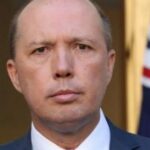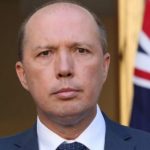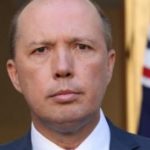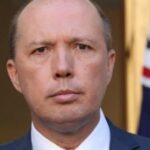Dutton at the Helm Would Only Hasten the AUKUS Dive Into Broadened US Control
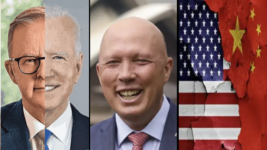
The fever pitch for war on China continues to grow, as the AUSMIN conference, an annual meeting of the US and Australian foreign and defence ministers, is set to take place in Brisbane this week, as US defence secretary Lloyd Austin and state secretary Anthony Blinken meet with local counterparts.
As ultraconservative thinktank ASPI (the Australian Strategic Policy Institute) put it, beginning on 28 July, AUSMIN will take place against “the backdrop of the largest ever iteration” of the biannual two-week-long Talisman Sabre Exercise: US and Australian war games held off the coast of Queensland.
First conducted in 2005, this year’s 10th Talisman Sabre, which, according to ASPI, “has long been a symbol of interoperability between the two nations”, involves eleven partner countries, with antiwar groups warning that this bolstering of manoeuvres now constitutes a direct threat to China.
The current escalation to war with China is unprecedented in this country, whether that be in our strategic positioning to “the enemy”, our rush to deck ourselves out with nuclear-powered attack submarines or in the increasing surrender of our foreign affairs decisions to the White House.
But while no one foresaw Labor taking to AUKUS and the handing over of control to Washington with such relish, voting out PM Anthony Albanese in 2025, as some have suggested as a solution, would only serve to ensure that Peter Dutton completely relinquishes our autonomy to the US empire.
Security state architect
Having a divisive figure like Dutton, not only continuing to hold a prominent role in national politics, but further leading one of the major parties, and currently slated to be the next prime minister if the current administration doesn’t hold office in the next term, does not bode well for a peaceful future.
During his time as the first minister responsible for the current Home Affairs portfolio, from late 2017 through to early 2021, Dutton drafted great tracts of national security legislation that served to solidify Australia as one of the most secretive and authoritarian liberal democracies on the planet.
The Queenslander passed laws that now permit government to order service providers to break through their own encryption systems and, over a series of pieces of legislation, he incrementally enabled Australian international spying agencies to turn their eyes on domestic targets.
After tinkering with national security and counterterrorism laws to the point where 90-odd bills have been passed to tighten up secrecy and surveillance in this country since 9/11, whilst broadening law enforcement and intelligence powers, the ex-police officer was then transferred to Defence.
And in taking over the Department of Defence in March 2021, Dutton was in control of it during the lead up to the formation of AUKUS, which then prime minister Scott Morrison unveiled, along with his counterparts US president Joe Biden and then UK PM Boris Johnston, in September that year.
The drive to war
On taking over the Defence portfolio, Dutton commenced heightening the rhetoric around the threat that China was posing in the Indo Pacific, as he asserted to ASPI in June 2021 that Beijing was already at war with our nation, in new forms of warfare known as “grey-zone”.
“These include,” the then minister of defence told the institute, “the use of tactics like cyber-attacks, economic coercion, financial disruption, trade interference, campaigns of disinformation, the use of paramilitary forces and the militarisation of disputed feature”.
The minister then went on to imply that “increasingly prosperous Indo Pacific nations”, code for China, were broadening investment in “increasing the range, sophistication and precision of their capabilities”, and he cited the growing importance of submarines in our region.
“The prospect of military conflict is less remote than in the past”, Dutton added, further signalling that we’re at growing odds with our largest trading partner, which Morrison had hinted at when he called for a global inquiry into the origins of COVID-19 in May 2020, which was a clear jibe at China.
A February 2022 note from the Pentagon has US defence secretary Austin speaking to then defence minister Dutton over the phone the month before last year’s election, about growing Indo Pacific security concerns, progressing the AUKUS pact and incorporating Japan into a trilateral agreement.
The AUSMIN meeting last December then saw Australian defence minister Richard Marles and foreign minister Penny Wong confirm that the trilateral terms with Japan were in place, which involves the Asian nation joining the US and Australia in preexisting force posture arrangements.
The future is interoperability
Australians paying attention were rightly shocked when PM Albanese announced the details of the AUKUS submarine deal in March, as it shackles us to a decades-long deal to acquire nuclear-powered attack submarines at an exorbitant price, which serves to make this nation a target for China.
Dutton was quick to quip that he would be happy to see the Albanese government cut funds to the NDIS, disability supports, to ensure the costs of the military expansion are covered, which Labor did carry out at the budget, as this is what he’d already envisaged when sitting in the seat of Defence.
The AUKUS deal also sees Australia opening up its waters to a joint US and UK nuclear powered submarine presence in the west of this country from 2027 onwards, which is part of a deal brokered by the Coalition and officially set in place by Labor.
In terms of how Japan will be joining the chorus, the US and Australian defence ministers announced at the last AUSMIN that they’ve arranged for Tokyo’s military to be incorporated into the building international military presence we’re now hosting in this country.
The initial force posture initiatives of 2011 saw the Gillard government and the Obama administration arrange for the permanent rotation of US marines through the NT, whilst the US received unimpeded access to dozens of local bases, which it can control when upgrading them.
But it was the Coalition, under then PM Tony Abbott, that set these initiatives in stone under the 2014 Force Posture Agreement providing the US with a growing amount of military control within this nation, which proves being an outpost of the US military is a bipartisan agenda in this country.
The great measures of control the Albanese government is currently gifting the White House, a situation also being mirrored in Papua New Guinea at present, isn’t going to be solved by running back into the arms of the Coalition architects of this long saga of bowing to US hegemony.
Indeed, as both majors are hurtling us towards what’s likely to be the most destructive war in human history, the people of this nation have already seen the writing on the wall, as was indicated in the mass turning away from both the Coalition and Labor at the last election.
So, the question left is, can the people of a subimperial power, like Australia, really progress peaceful and independent changes to the course they’re already on under the US-imposed “rules-based order” that’s seen our nation blindly follow it into eight overseas wars since World War II?


